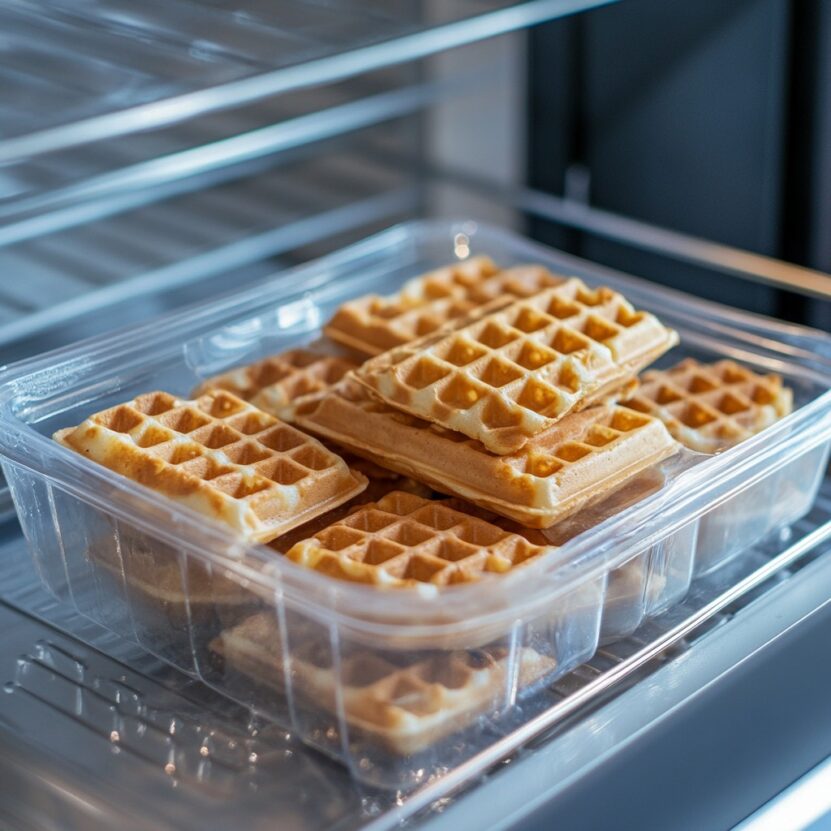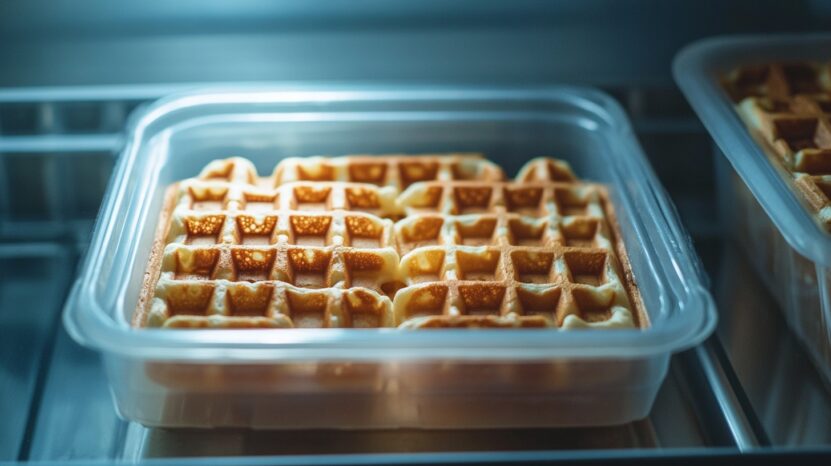
Share Post:
Breakfast is by far my favorite meal, and among all my go-to breakfast choices, frozen waffles have a special spot.
They’re fast, convenient, and can be topped with endless possibilities. But a question always lingers, “should they be refrigerated?”
To get to the bottom of it, we’ll go into detail about what frozen waffles are made of, their shelf life, and the best storage practices.
We’ll also cover how storage affects their quality and taste, potential health risks from improper handling, and whether refrigeration impacts their texture and flavor.
Freezing vs. Refrigerating
When storing frozen waffles, a common question is whether to freeze or refrigerate them. While both options may seem viable, there are key differences to consider.
- Helps maintain quality and safety for a longer period
- Inhibits the growth of bacteria
- Slows down the deterioration
- Is ideal for long-term storage
Refrigeration, on the other hand, is generally not advised. Although it can keep waffles safe to eat for a short time, it has significant drawbacks:
- It’s not as effective for long-term storage
- The warmer temperature accelerates deterioration, leading to a decline in quality
- They can become unsafe to eat more quickly
- Refrigeration can negatively impact texture and taste:
- Moisture can make the waffles soggy
- They may absorb odors from other foods in the fridge
What Do You Need to Know About Frozen Waffles?

Frozen waffles are a type of pre-cooked waffle that has been frozen and packaged for retail sale. These waffles offer a convenient breakfast solution, as they can be quickly reheated in a toaster or oven.
That makes them a popular choice for busy mornings when you need something fast, easy, and satisfying. Frozen ones come in various flavors, textures, and sizes, catering to different tastes and dietary preferences.
Types of Waffles
There are several different types of frozen waffles available in the market, and each one is made from different ingredients, which can influence their storage requirements.
- Flour
- Eggs
- Milk
- Sugar
However, with the increasing demand for healthier or specialized diets, you’ll also find frozen waffles made from whole grains, gluten-free ingredients, and even plant-based or protein-enriched varieties.
- Traditional usually have a longer shelf life when stored properly in the freezer.
- Whole grains may require more careful storage due to their natural ingredients, which can be more susceptible to moisture and spoilage.
- Gluten-free often have a different texture and may not hold up well if refrigerated instead of being kept frozen.
The type of waffles you choose will impact not only their taste but also how you store them, as each kind of ingredient can have varying needs to maintain freshness and quality.
Homemade vs. Store-Bought

It’s important to recognize the difference between homemade and store-bought, as their storage requirements can vary significantly.
Store-bought waffles are made using industrial cooking and freezing methods, which often involve preservatives and specialized packaging designed to extend shelf life and protect the product from freezer burn.
Commercially produced ones are usually frozen shortly after they’re made and sealed in airtight packaging to prevent moisture from affecting their texture and flavor.
On the other hand, homemade frozen waffles don’t typically contain preservatives and may not be packaged as securely.
It means that if you make your own and freeze them for later use, you’ll need to be more mindful of how you store them.
For best results, homemade waffles should be placed in airtight containers or freezer bags to prevent exposure to air, which can lead to freezer burn and affect their taste and texture when reheated.
Storage Factors
The storage of frozen waffles is influenced by several factors, including the type of packaging, the state of the packaging (whether it’s been opened or not), and the ingredients used in the waffles.
If the packaging has not been opened, frozen waffles are generally safe to store in the freezer for an extended period.
However, once the package has been opened, they are exposed to air and moisture, which can speed up deterioration.
- Opened packages: Once a package is opened, it’s important to seal it tightly or transfer the waffles to an airtight container or freezer bag to preserve freshness.
- Refrigerating: Some people may wonder if it’s possible to store frozen waffles in the refrigerator instead of the freezer.
- Frozen storage: Keeping them frozen in the freezer ensures they maintain their crisp texture and fresh taste when reheated.
The texture makes this case similar to the case of refrigerating cupcakes.
Storing Unopened and Opened Packages

An unopened package of frozen waffles is typically shelf-stable when kept in the freezer, thanks to the freezing process and airtight packaging.
Once the package is opened, the storage requirements change and careful handling becomes crucial.
When you open the package, the waffles are exposed to air and moisture, which can compromise their freshness and increase the risk of spoilage.
To minimize this risk, it’s important to reseal the package tightly after each use.
If possible, you should return the opened waffles to the freezer, where the cold temperatures will preserve their quality and safety for a much longer period.
While refrigeration is generally not recommended for unopened ones, it can be an option for short-term storage if freezer space is limited.
However, refrigerating may lead to changes in texture and taste over time.
It’s best to consume refrigerated waffles within a few days to prevent them from becoming soggy or absorbing unwanted odors.
Proper Storage Recommendations
To ensure the quality and safety of frozen waffles, it’s crucial to follow the manufacturer’s storage guidelines.
We can see some of the guides in the report by Sandra McCurdy, Joey Peutz, and Grace Wittman, published by Oregon State University.
These recommendations are tailored to the specific formulation and packaging, with most advising that they be stored in the freezer.
Freezing preserves them by inhibiting bacterial growth and slowing down deterioration, allowing them to maintain their taste and texture.
For optimal storage, keep the waffles in a part of the freezer where the temperature consistently stays below 0°F (-18°C).
It ensures they will remain in prime condition and safe for consumption over time.
Another key aspect of proper storage is protecting the waffles from freezer burn, which occurs when they are exposed to air in the freezer.
Freezer burn can cause them to dry out and develop an unpleasant, tough texture. To avoid this, ensure the waffles are tightly sealed in their original packaging.

Closing Thoughts
The decision to refrigerate frozen waffles depends on various factors, including their type, packaging, and whether the package has been opened.
Most commercially available frozen ones are specifically designed to be stored in the freezer, both before and after opening, to maintain their quality and freshness.
That said, refrigeration can be a short-term option if needed, though it may impact the texture over time. Proper storage is key to preserving the waffles’ taste, quality, and safety.







